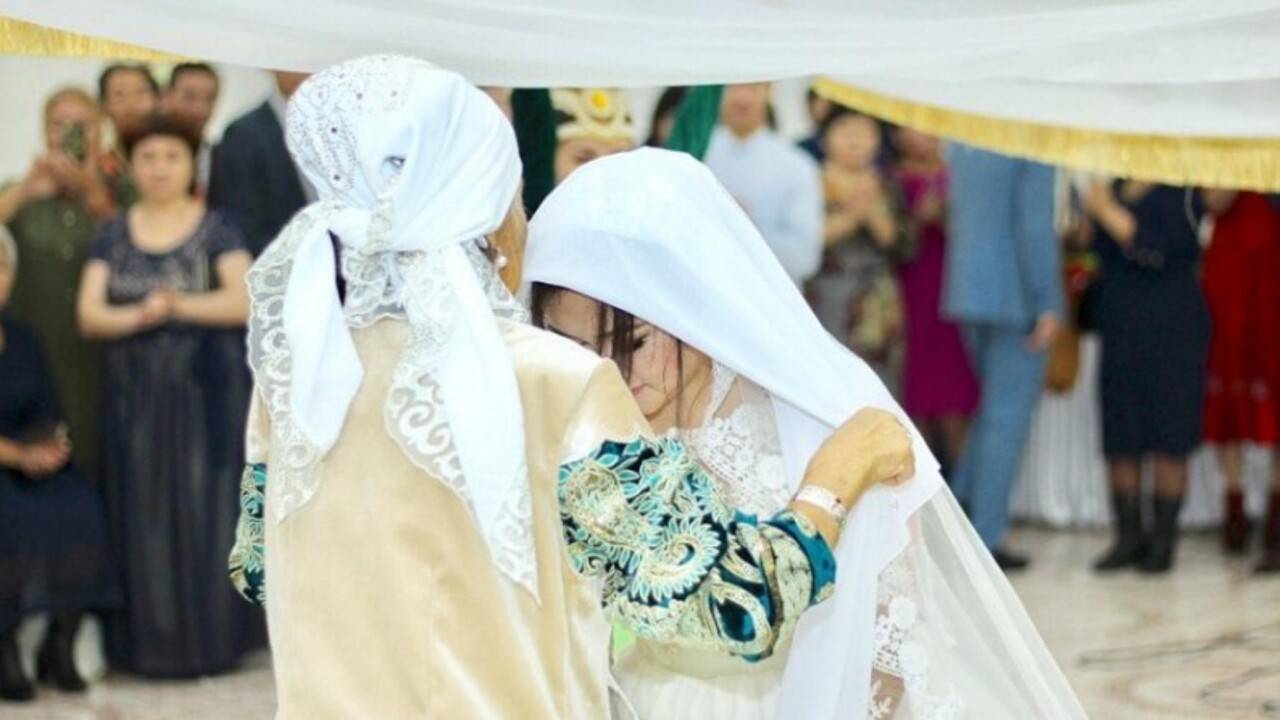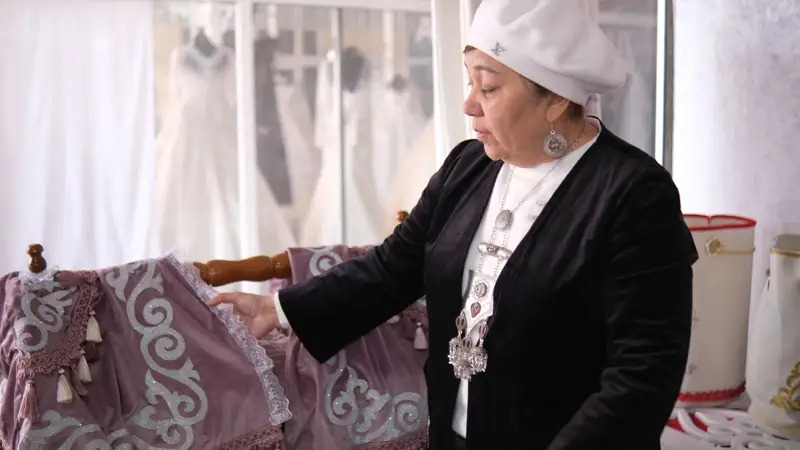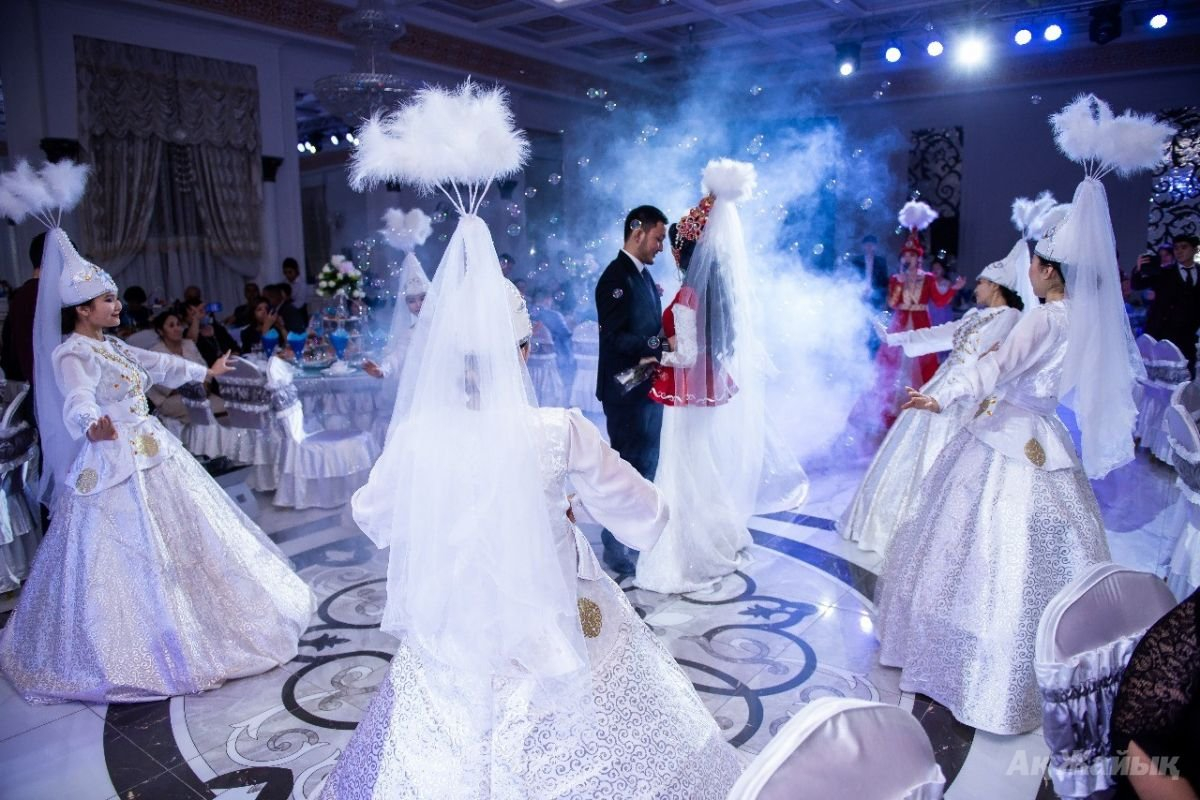ASTANA – Recent social survey results highlight that while Kazakh families continue to cherish marriage-related traditions, support for costly weddings and outdated practices, such as bride kidnapping, has significantly declined, reported Ranking.kz monitoring website.

Betashar is a ceremony of the bride’s acquaintance with her husband’s relatives, one of the wedding ceremonies. Photo credit: kzvesti.kz
The survey was conducted by the Kazakhstan Institute of Public Development (KIPD), a leading research and analytical center in social studies. The study, titled Peculiarities of Intergenerational Interaction in Kazakh Families, surveyed people on traditional values to assess the extent to which they support a particular tradition related to marriage and family life.
The findings were the result of 31 in-depth interviews with individuals aged 18 and older who live with relatives from different generations. The study covered the cities of Astana, Almaty, Shymkent, Semei, Aktobe, and Kostanai to ensure representation from all regions of Kazakhstan.
“Intergenerational interaction is one of the important conditions of social development, as it ensures the continuity of values and successful socialization of the younger generation. The impact of globalization, rather rapid and significant changes in the cultural context, socio-economic and political conditions in Kazakhstan and around the world complicate intergenerational interaction and make it multidimensional,” reads the report.
Just over half of the respondents (55.3%) believed that adhering to national customs and traditions is an essential prerequisite for the prosperity of a family. One-third of respondents said that observance of traditions is desirable but not obligatory, while 11.4% believed that traditions and customs are not important for family well-being at all.
Kazakh citizens place greater importance on mutual love and respect between spouses, mutual understanding between children and parents, absence of harmful addictions among family members as key factors that strengthen the foundation of a family.
Traditions related to marriage
Traditions such as kalyn mal (ransom for the bride), dowry and the elders’ right to name the oldest child find great support among the population. Over 70% of respondents noted that they have a positive or somewhat positive attitude towards the custom of bride price (72.1%) and parents’ obligation to prepare a decent dowry before their daughter’s marriage (78.6%). Similarly, 75.9% of respondents support the practice of granting the husband’s parents the right to name the first-born child. Additionally, more than 77% believe it is appropriate for one of the sons, typically the youngest, to live with his parents.

Dowry is the property given by the daughter’s parents when she got married. Photo credit: kazinform
More ambivalent is the attitude towards bauyryna salu custom, which refers to an ancient tradition of giving a child for upbringing to elderly parents or childless relatives. This custom is well-depicted in the “Bauryna Salu” (Adoption) film by Kazakh director Askhat Kuchinchirekov. Overall, 53.6% of the respondents have a positive attitude toward bauyryna salu tradition, while the rest of the respondents consider it wrong for various reasons.
Lavish weddings
When it comes to wedding expenses, in many cases, the cost of lavish weddings does not reflect the family’s social status. It rather exceeds it, leaving many families burdened with debt. During sample surveys of households, conducted in 2024 by Kazakhstan’s Bureau of National Statistics, 34% of respondents reported that they could not afford to organize various ceremonies without incurring burdensome debts.

Photo credit: aikyn.kz
According to the KIPD report, only 35.7% of respondents have a positive attitude towards lavish weddings on credit. Over 60% oppose such extravagance, especially if the family cannot comfortably settle a large debt.
Attitudes toward lavish weddings vary across Kazakhstan. For example, the East Kazakhstan Region has one of the lowest rates (2.9%) of respondents who support holding extravagant celebrations. In contrast, Turkistan and Kyzylorda regions show much higher support, with 50.7% and 53.3%, respectively, favoring such practices.
Bridal theft
The survey shows a decline in the support of certain traditions that are increasingly seen as outdated. One such tradition is bride kidnapping, known as kyz alyp kashu in Kazakh.
Among Kazakhs, 71.1% of respondents do not support such behavior from men. However, 26.2% express a positive or somewhat positive view of this method of starting a family.

Photo credit: Tengrinews.kz /Alikhan Sariyev
The practice of abducting girls for the purpose of marriage is still common in the country, especially in the southern regions. It is important to understand the fundamental difference between the tradition of alyp kashu, when a woman herself agrees to run away and get married, and the crime of being kidnapped and held against her will.
The Human Rights Commissioner’s Office is considering amendments to the Criminal Code, including the introduction of a separate article addressing the abduction of women for forced marriage. The Kyrgyz Republic, Uzbekistan, and Turkmenistan each have distinct legal provisions on the matter.
Living with parents
The survey also found that the custom of parents living with their son’s new family remains highly valued. In all regions, except for Pavlodar, over 50% of respondents support this custom. The highest levels of support are seen in the southern regions of the country.
The survey experts note that respondents most often cite tradition as the main reason for multiple generations living together, followed by the inability of young families to afford their own homes. In-depth interviews reveal that the primary reason is still the lack of financial independence among young families. Assistance with raising grandchildren ranks third among the reasons.
